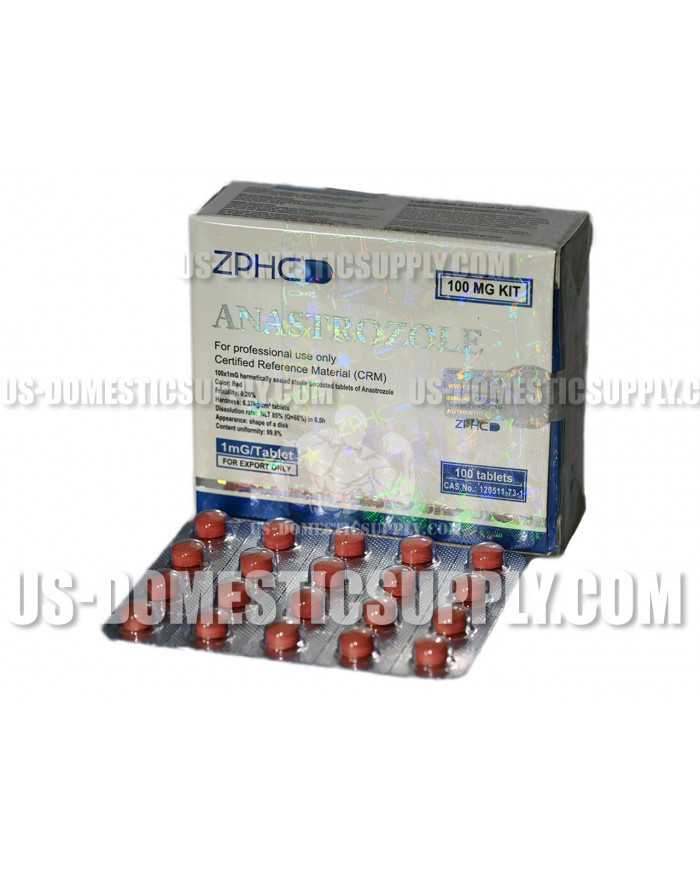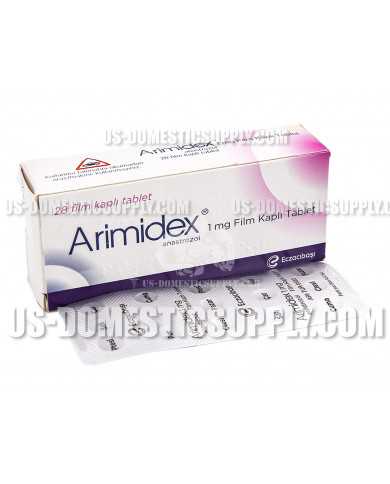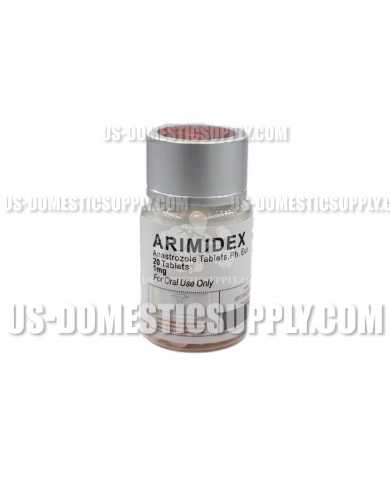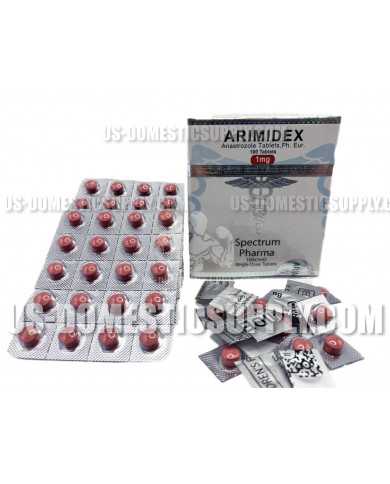OVERVIEW AND HISTORY OF ARIMIDEX
Arimidex belongs to a category and class of drugs known as aromatase inhibitors (AIs). Aromatase inhibitors belong to an even broader class of drugs known as anti-estrogens. The other subcategory of drug under the anti-estrogens category is known as selective estrogen receptor modulators (SERMs), such as Nolvadex and Clomid. AIs and SERMs make up anti-estrogens. Aromatase inhibitors differ greatly from SERMs in their action and how they deal with the issues of estrogen control. The misunderstanding that SERMs, such as Nolvadex and Clomid, serve to lower estrogen levels must first be addressed. This is a persistent rumor among the anabolic steroid using community that has begun to erode as of late, but the rumor still persists. SERMs serve to block the action of Estrogen at the receptor sites in breast tissue by occupying the receptor sites in place of Estrogen so that Estrogen itself cannot exert its effects there through receptor site binding. Conversely, SERMs will also act as Estrogens at receptor sites at other cells in other areas of the body (the liver, for example in Nolvadex’s case). SERMs do not lower circulating levels of Estrogen in blood plasma. Aromatase inhibitors serve to do this by eliminating the production of Estrogen through binding to and disabling the aromatase enzyme, which is the enzyme responsible for the conversion (or aromatization) of androgens into Estrogen.
Arimidex is an aromatase inhibitor developed by Zeneca Pharmaceuticals (now AstraZeneca) that was originally synthesized and designed for the treatment of female patients suffering from advanced breast cancer. It was approved for use by the FDA and released onto the American prescription drug market in 1995. Arimidex is regarded as one of the newer aromatase inhibitors, known as a third generation aromatase inhibitor. The reason as to why both aromatase inhibitors and SERMs act to block Estrogen’s effects in different manners is because it has been found that the vast majority of breast cancers are stimulated and accelerated by Estrogen.
Arimidex is used among breast cancer treatments as what is known as an adjunct treatment. This usually refers to an additional treatment when other standard treatments have failed to meet proper expectations. Prior to the development and release of Arimidex as a breast cancer treatment medication, the primary medication utilized for treatment for decades prior was Nolvadex (Tamoxifen). Nolvadex is considered to be utilized as the first and standard treatment for breast cancer patients. When Nolvadex treatment,for one reason or another, fails to meet expectations during breast cancer treatment, second-line adjunct drugs such as Arimidex are utilized.
One such study on Arimidex on over 9,000 post-surgery female breast cancer patients observed its efficiency in comparison to Nolvadex (both alone as well as both utilized simultaneously), resulting in far more favorable outcomes for Arimidex over Nolvadex. The study, which was performed in 2002, concluded that Arimidex was far more effective at cancer regression, as well as increasing the survival rate of the breast cancer patients following treatment. It was then this study (as well as others) that then of course prompted individuals among the anabolic steroid using community to take notice of it and begin investigating the benefits of its effects on strong Estrogen levels suppression. A study conducted later on demonstrated that the risk of recurrence of breast cancer was eliminated by 40% with Arimidex use, but the patients experienced an increase in bone fractures. This is because Estrogen plays a central role in the proper maintenance of bone and its mineral retention, and this will become significantly reduced following the vast reduction of Estrogen levels resultant of Arimidex administration.
Because Arimidex was the very first aromatase inhibitor for many bodybuilders to have taken notice of, it is the most popular aromatase inhibitor used among anabolic steroid users for the purpose of Estrogen control. The use among anabolic steroid using athletes is for the control of almost all Estrogen-related side effects: the manifestation of gynecomastia, water retention and bloating, rising blood pressure (as a result of water retention increases from Estrogen). This is in contrast with SERMs such as Nolvadex, which only serve to block gynecomastia. Studies have in fact demonstrated that Arimidex use in males has been effective enough to reduce circulating blood plasma levels of Estrogen by 50% at only a dose of 0.5 – 1mg daily. This is a very considerable decrease in men, but can be seen as quite different from the 80% reduction in female breast cancer patients, but it must be remembered that Estrogen and how it relates to the female physiology is different from males.
Aside from the use in bodybuilders, Arimidex has also been medically used in males as well. Some males exhibit abnormally high Estrogen levels of many different reasons and Arimidex has been utilized in order to combat these ailments. In particular, Arimidexhas been used to treat male adolescents that exhibit excessive Estrogen levels during purberty, resulting in unwanted pubertal gynecomastia. In addition, excessive Estrogen levels in adolescent males during puberty can often result in stunted growth due to the fact that Estrogen plays a key role in fusing the growth plates of the bones shut, preventing any further linear growth, and Arimidex has also been used to treat these conditions as well.
CHEMICAL CHARACTERISTICS OF ARIMIDEX
Arimidex is a non-steroidal aromatase inhibitor. This is to say that it does not possess the characteristic four ring cycloalkane ring carbon structure common of all types of steroids.
PROPERTIES OF ARIMIDEX
Arimidex’s effects on serum Estrogen level control can be quite drastic even at a dose of 1mg daily. The amount of Estrogen suppression resulting from this dose has been demonstrated to be over 80% in patients. Arimidex can be so effective at inhibiting the aromatase enzyme and thereby reducing Estrogen levels that this compound is typically only administered to post-menopausal females, and/or utilized when other first-line treatments for breast cancer has failed.
Arimidex and Letrozole are both classified as non-steroidal and non-suicidal aromatase inhibitors that compete with the substrate for binding to the enzyme active site. This is very different from Aromasin (Exemestane), which is a steroidal and suicidal aromatase inhibitor that acts as a mechanism-based steroidal inhibitor that mimics the substrate, is converted by the enzyme to a reactive intermediate, and results in the inactivation of the aromatase enzyme . For ease of understanding, what this means to the layman is that Aromasin’s chemical structure resembles the traditional ‘targets’ that aromatase binds to (Testosterone, for example) and that it essentially ‘fools’ the aromatase enzyme into binding with it, only to become inhibited/deactivated. Because the binding strength is so great, this inhibition becomes permanent for the aromatase enzyme that Aromasin has become bound to. Arimidex and Letrozole, being non-suicidal aromatase inhibitors, both compete with the enzyme’s traditional ‘targets’ rather than being assured a permanent spot (which is the advantage that Aromasin has over the other two).
Bodybuilders and athletes utilizing anabolic steroids will usually favor aromatase inhibitors such as Arimidex for its ability to eliminate rising Estrogen levels at its root cause: aromatase. By disabling the aromatase enzyme, supraphysiological levels of aromatizable androgens (such as Testosterone, Dianabol, Boldenone, etc.) cannot convert into Estrogen, thereby eliminating any possible risk of Estrogen-related side effects.
ANASTROZOLE (AKA ARIMIDEX)
Chemical Name: 2,2′-[5-(1H-1,2,4-triazol-1-ylmethyl)-1,3-phenylene]bis(2-methylpropanenitrile)
Molecular Weight: 293.366 g/mol
Formula: C17H19N5
Original Manufacturer: AstraZeneca
Half Life: 46 – 48 hours (approximately 2 days)
Detection Time: 2 weeks
Anabolic Rating: N/A
Androgenic Rating: N/A
ZPHC ANASTROZOLE (ARIMIDEX) 1MG 100 TABS
Reviews
No customer reviews for the moment.













